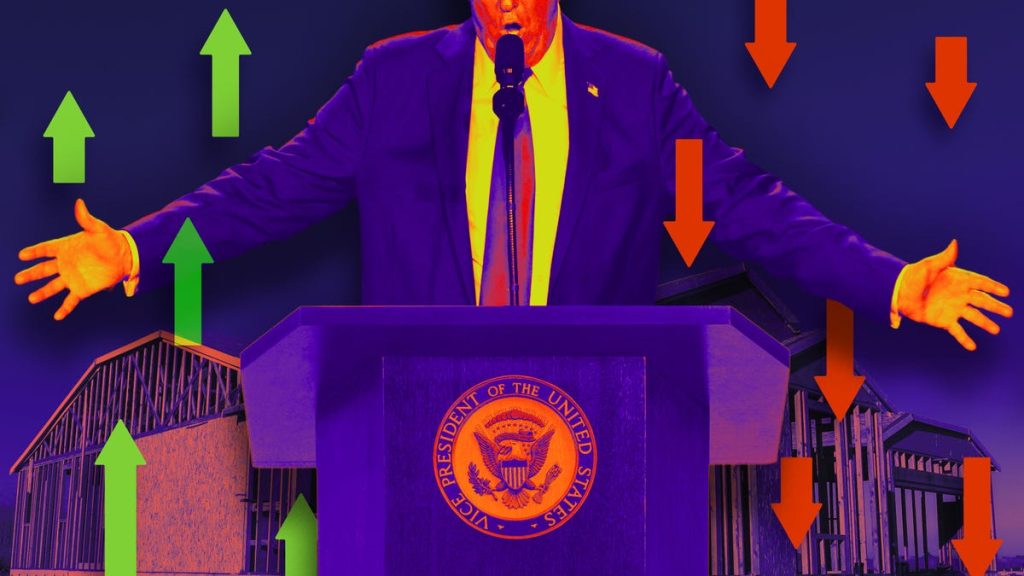A second Donald Trump presidency could significantly impact the housing market, although predicting the exact effects is challenging. An analysis of his past policies and campaign rhetoric offers some clues. Trump has advocated for lower mortgage rates, even suggesting a target of 3%. However, such low rates typically accompany severe economic downturns, an undesirable outcome for everyone. The interplay between presidential policies and the housing market is complex, influencing affordability, lending practices, and housing inventory. While some potential Trump policies might benefit homebuyers, others could create obstacles. Ultimately, the impact on individual buyers and homeowners will depend on a combination of these factors.
Potential positive impacts on the housing market stem from several of Trump’s favored policy positions. Tax cuts, a cornerstone of his previous administration, could free up more disposable income for potential homebuyers to save for down payments. Further changes to the state and local tax (SALT) deduction cap could also provide tax relief, particularly for homeowners in high-tax states. However, the resulting decrease in government revenue could exacerbate the federal deficit. Deregulation, another key element of Trump’s agenda, could streamline the lending process, making it easier for individuals to qualify for mortgages. However, the impact of deregulation on lending practices is likely to be gradual rather than immediate. Proposed reforms to Fannie Mae and Freddie Mac, aimed at privatizing these government-sponsored enterprises, could foster competition in the mortgage market, though it also carries the risk of increasing mortgage rates due to the removal of government guarantees. Finally, investments in infrastructure, often touted by Trump, have the potential to create jobs, stimulate local economies, and open up new housing markets. The effectiveness of such investments, however, hinges on their implementation and allocation.
Conversely, several potential Trump policies pose risks to the housing market. Stricter immigration policies, a hallmark of his previous term, could lead to labor shortages in the construction sector, driving up building costs and slowing the development of new homes. This could disproportionately impact states like Texas and Arizona, which are experiencing significant new construction activity. The imposition of tariffs on imported building materials, another potential policy under a Trump administration, would further escalate construction costs, likely passed on to homebuyers in the form of higher prices. Furthermore, while Trump champions pro-business and pro-growth policies, a robust economy often leads to higher inflation. This could compel the Federal Reserve to maintain or even increase interest rates to control inflation, ultimately increasing borrowing costs for homebuyers.
The Federal Reserve operates independently of the president, but its monetary policy decisions are influenced by the overall economic climate. Significant drops in mortgage rates typically occur during economic slowdowns or recessions, scenarios everyone wants to avoid. The Fed considers a wide range of economic data when making policy decisions. If Trump’s policies spur economic growth and maintain high inflation, the Fed might be forced to slow down or halt interest rate cuts. A strong economy presents both advantages and disadvantages for homebuyers. While higher wages and job growth improve affordability and mortgage qualification prospects, strong demand coupled with limited housing inventory can drive up home prices, making it more challenging to find affordable homes.
Simultaneously achieving lower taxes and lower interest rates is difficult. Tax cuts tend to stimulate economic activity, often leading to increased inflation. To combat inflation, the Federal Reserve typically raises interest rates. Historically, these two economic conditions rarely coexist. Therefore, even if taxes are reduced under a second Trump presidency, a corresponding decrease in mortgage rates is unlikely.
Deciding whether to buy a home in 2025 under a potential Trump administration requires careful consideration. Waiting for ideal market conditions is not always a winning strategy. Significant drops in mortgage rates often attract more buyers, increasing competition and pushing up prices. If you have a stable financial situation with savings, good credit, and consistent income, 2025 could be a suitable time to buy. It’s crucial to prioritize factors within your control, like budgeting and finding a home that meets your needs. Ultimately, the decision to buy a home should be based on your personal circumstances rather than attempting to perfectly time the market.










